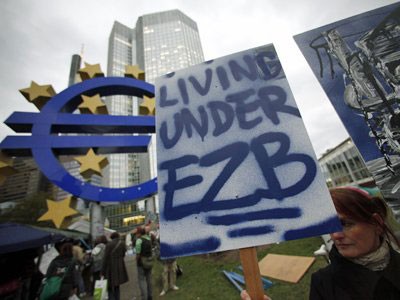(VOVworld) – Negative information on the ongoing debt crisis in the Eurozone has made the headlines worldwide. This means the crisis has become worse than expected. VOV’s editor Hong Van analyzes ….
 |
| European Central Bank in Frankfurt, Germany - (Photo: Tấn Đức) |
Germany known as the biggest European economy is the latest country to be named in the list of nations hit by the public debt crisis. The country’s Federal Ministry for Economics and Labor predicts that its exports turn-over, the main pillar of the German economy, declined by 3.4% in September. Some major enterprises have begun to sack employees, even the automobile industry has signaled worn-out as manufacturers are forced to lower the prices to ensure sale turnover. More importantly, the Ministry says the stagnation of the national economic growth in the fourth quarter of this year is likely to last until the first three months of next year. France is also on the verge of recession when the French bank has forecast that in this quarter, the economic growth continues to decline 0,1%, the same as the previous quarter.
In such context, the EC’s autumn economic forecast that was released last week has further gloomed the continent’s economic panorama. Accordingly, the real GDP is set to contract by 0.4% this year in the euro 17 - member area as the crisis has reduced people’s reliability and made the unemployment rate to a high record. Spain’s budget deficit is estimated to be in excess of 6.4% of the GDP in 2014 leaving far behind the 2.8% target set in the beginning of this year and the 3% GDP threshold set by the EU. Germany is likely to enjoy a growth of 2% in 2014, a modest rate compared to EC’s previous estimation. Greece, which has adopted the fourth austerity cuts over the past two years, is facing a towering unemployment rate. One fourth of the labor force are unemployed while its public debt accounts for 170% of the GDP and under the tough austerity plan, the figure can increase by 220% in 2016.
Olli Rehn, EU Economic and Monetary Affairs Commissioner, said that there haven’t been answers for the European issue.
The public debt crisis has also affected the budget supplement for the EU. The latest evidence is the negotiation on next year’s EU budget had failed after a number of countries supported the austerity plans and refused to spend for the funds to help poorer members. The EC and the European Parliament had proposed raise the budget by 6.8% equivalent to 138 billion euro next year but EU members only wanted a rise of 2.8%. Parties concerned had been unable to reach consensus on making up the deficit of 8.9 billion euro that have been spent this year. The sponsors blamed for unable to loosen their purse-strings when their citizens are living a harder life.
A longer list of countries hit by the Europe’s public debt crisis and hardship to reach a joint agreement on the EU’s budget mean the financial downturn is continuing and causing great damages for this continent.
Hong Van